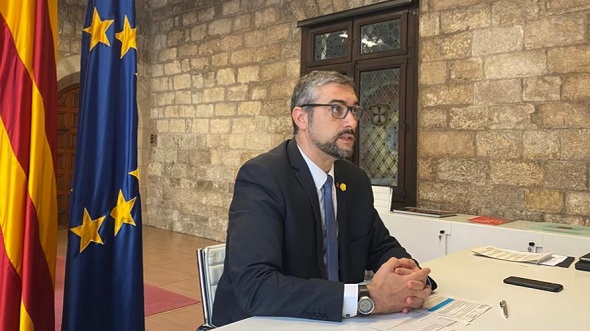
The Minister of Foreign Affairs, Institutional Relations and Transparency, Bernat Solé, and the Secretary for Foreign Affairs and the European Union, Elisabet Nebreda, took part in the 140th plenary session of the Committee of the Regions of the Union European in the framework of the European Week of Cities and Regions. They participated in four debates to express Catalonia's opinion on the European Green Pact, the European Recovery Fund, social affairs and the humanitarian aid to the refugees in Moria Refugee Camp.
Debate on the European Green Deal with Vice-President Frans Timmermans
In the debate on the European Green Deal with the Vice-President of the European Commission, Frans Timmermans, Solé emphasized the good practices of the Catalan Government to incorporate the Sustainable Development Goals into the 2020 budget and the Economic Recovery Fund and social protection. The Minister also showed Catalonia's commitment to the Green Deal with other examples such as Catalonia's climate change law, the natural heritage and biodiversity strategy, the maritime strategy and the law against food waste. "We will only leave a better future if we can bring the European Green Deal closer to the citizens", concluded Solé.
Debate on Resilience and Recovery with Commissioner Paolo Gentiloni
In the debate on resilience and recovery, the Minister reminded the Commissioner of Economy Paolo Gentiloni that "regional governments have been at the forefront during coronavirus crisis and have vast experience in managing European funds".
Solé explained that the Economic Reactivation and Social Protection Plan drawn up by the Catalan Government includes the priorities set by the European Commission and claimed that “a large volume of the fund requires an important role for the European regions and therefore we have to be present during the development, implementation and supervision”.
"The urgency of the exceptional moment we live in requires a mechanism of recovery and resilience available to the public as soon as possible", warned the Minister.
Debate on Humanitarian Aid to Moria Refugee Camp
The Secretary of Foreign Affairs and the European Union, Elisabet Nebreda, expressed solidarity for the refugees in Moria. She stated that humanitarian aid from regional and local authorities should be provided and she reported the conditions refugees live in the Moria camp in Lesbos. "How can we allow the existence of a camp with similar conditions to those the Republican exiles had to endure in the 1930s?", she asked.
Nebreda said “when the fire destroyed most of the Moria camp, the Catalan Government informed the European Commission and the Spanish Government about its will to help relocate up to 100 people, in addition to 20 unaccompanied minors”. The Secretary regretted that "we still have not received any response".
“We want to join forces as fast as possible with the regions that also believe it is high time to put an end to the biggest shame of Europe; it is our moral obligation to pressure our national governments to take action,” said Nebreda.
When she had the floor, the Secretary insisted that "regional and local governments need to work together with national and international institutions and, if necessary, remove the obstacles that prevent us from doing more".
“Europe cannot forget its origins. We endured this suffering not so long ago, and it led us to build a project for a better future. But what future can there be if the European project gives up its values and loses its soul?”, Nebreda has asked out loud.
Debate on Social Affairs with Commissioner Nicolas Schmit
Secretary Elisabet Nebreda also took part in the debate on social affairs, chaired by Commissioner Nicolas Schmit. Nebreda reminded that “people are being evicted from their homes, are losing their jobs and inequality is growing faster. It is the worst social, economic and health crisis that the European Union has experienced”.
The Secretary of Foreign Affairs and European Union thus said: “We must act now. Right now. Investment in people and confrontation of inequalities arising from the crisis is essential and should be set as a priority of the resilience and recovery fund”.
Secretary Nebreda approved that the European Council coordinates the minimum wages to strengthen Europe at the social level, but she reminded that “regional governments need to play a role, because they have competences in social matters and have already undertaken initiatives in this regard ”.